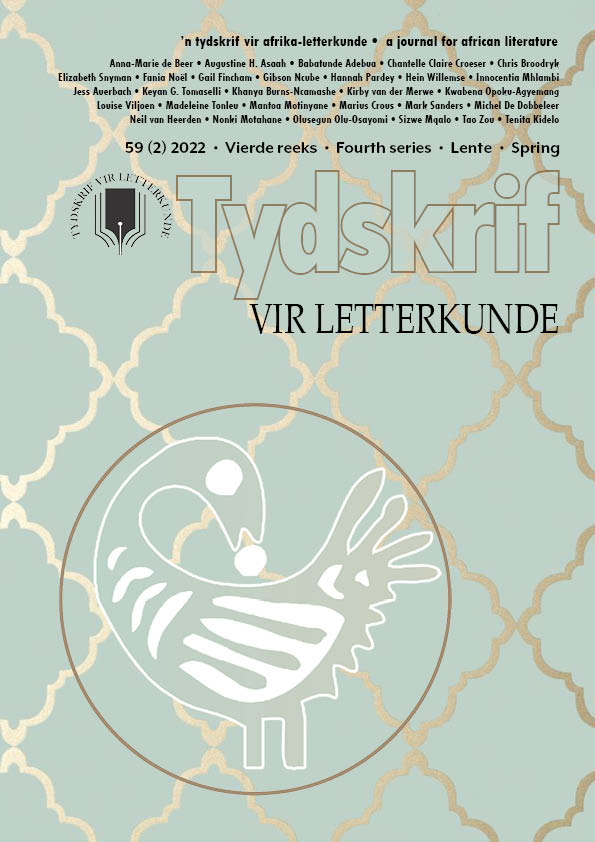Langue, éducation et transformation dans Hum If You Don't Know the Words de Bianca Marais.
DOI :
https://doi.org/10.17159/tl.v59i2.10942Mots-clés :
Soulèvement de Soweto 1976, appropriation de la langue, Art and Answerability de Bakhtin, auteur implicite, manipulation narrative anticipant le monde post-apartheidRésumé
Dans cet article, j’analyse le premier roman de Bianca Marais, Hum If You Don’t Know the Words (2017). Je considère d’abord sa relation avec les événements historiques du soulèvement de Soweto de 1976, puis j’examine ses méthodes de composition. Le problème qui a précipité le soulèvement de Soweto, au cours duquel des centaines d’écoliers noirs ont été abattus par la police, était le refus des Noirs de Soweto de recevoir un enseignement en afrikaans plutôt que dans leur langue maternelle. Leur révolte était à la fois tragique et triomphante : tragique en raison du sacrifice de jeunes vies, triomphante parce qu’elle marquait le nouveau pouvoir des habitants de Soweto sur l’appropriation de leur propre langue. Dans l’esprit de cette autonomie linguistique, Marais célèbre le pouvoir de la langue à créer des rencontres interculturelles et intergénérationnelles, en écrivant un dialogue qui marie la diversité sociale à l’élasticité linguistique. Dans ce mariage, son écriture s’accorde fortement avec le travail du linguiste et philosophe russe Mikhail Bakhtin, dont le texte Art and Answerability examine l’éthique de l’écriture et aide le lecteur à reconstituer l’intention de l’auteur implicite. La recherche des perspectives de l’auteur implicite révèle l’activisme politique de Marais ainsi que sa maîtrise du dialogue. Son roman s’inscrit dans la tradition créée par les écrivains dans les années 1970 et 1980 alors que l’apartheid battait son plein, pour anticiper un monde post-apartheid. Le roman de Marais illustre une réinvention politique, culturelle et linguistique par sa manipulation de la narration.
Téléchargements
Références
Al-Shawaf, Rayyan. “Rousing quest for redemption in apartheid South Africa.” Toronto Star. 21 Jul. 2017. https://www.thestar.com/entertainment/books/reviews/2017/07/21/rousing-quest-for-redemption-in-apartheid-south-africa.html.
Apte, Poornina. “Hum If you Don’t Know the Words: Book Review.” Booklist vol. 113, 2017, p. 53.
Bakhtin, Mikhail. Art and Answerability: Early Philosophical Essays, edited by Michael Holquist & Vadim Liapunov. U P of Texas, 1990.
Apte, Poornina. “Discourse In the Novel.” The Dialogic Imagination: Four Essays, edited by Michael Holquist. U P of Texas, 1981, pp. 259–422.
Apte, Poornina. Problems of Dostoevsky’s Poetics, edited and translated by Caryl Emerson. U of Minnesota P, 1984.
Brink, André. “Interrogating silence: new possibilities faced by South African literature.” Writing South Africa: Literature, apartheid and democracy, 1970–1995, edited by Derek Attridge & Rosemary Jolly. Cambridge U P, 1998, pp. 14–28.
Brink, André. “Stories of history: reimagining the past in post-apartheid narrative.” Negotiating the Past: The Making of Memory in South Africa, edited by Sarah Nuttall & Carli Coetzee. Oxford U P, 1998, pp. 29–42.
Coetzee, J. M. Doubling the Point. Harvard U P, 1992.
Derrida, Jacques. The Work of Mourning, edited by Pascale-Anne Brault & Michael Naas. U of Chicago P, 2001.
Finchilescu, Gillian & Andy Dawes. “Adolescents’ Future Ideologies through Four Decades of South African History.” Social Dynamics vol. 25, no. 2, 1999, pp. 98–118. DOI: https://doi.org/10.1080/02533959908458677.
Hart, Kelly. “Writing Dialogue to Bring Your Writing to Life with Author Bianca Marais.” Muskoka411. 2 Jan. 2021. https://muskoka411.com/writing-dialogue-to-bring-your-writing-to-life-with-author-bianca-marais/.
Hawthorn, Jeremy. A Glossary of Contemporary Literary Theory: Fourth Edition. Bloomsbury Academic, 2000.
Holland, Heidi. Born in Soweto: Inside the Heart of South Africa. Penguin, 1994.
Jones, Charisse. “Moving novel opens a window into South Africa’s tortured history.” USA Today. 8 Aug. 2017. https://www.usatoday.com/story/life/books/2017/08/07/moving-novel-opens-window-onto-south-africas-tortured-history/532977001/.
Mandela, Nelson. Long Walk to Freedom. Abacus, 1994.
Marais, Bianca. Hum If You Don’t Know the Words. G. P. Putnam’s Sons, 2017.
Marais, Bianca & Bennet S. Johnson. “Author Interview: Bianca Marais.” Medium. 12 Jul. 2017. https://medium.com/the-ribbon/author-interview-bianca-marais-ce9e82e31263.
Morris, Pam. “A Glossary of Key Terms.” The Bakhtin Reader: Selected writings of Bakhtin, Medvedev, Volosinov, edited by Pam Morris. Edward Arnold, 1994, pp. 245–52.
Ndebele, Njabulo. “Memory, metaphor and the triumph of narrative.” Negotiating the Past: The Making of Memory in South Africa, edited by Sarah Nuttall & Carli Coetzee. Oxford U P, 1998.
Sachs, Albie. “Preparing ourselves for freedom.” Writing South Africa: Literature, apartheid and democracy, 1970–1995, edited by Derek Attridge & Rosemary Jolly. Cambridge U P, 1998, pp. 239–48.
Volosinov, Valentin. “Freudianism: A Critical Sketch.” The Bakhtin Reader: Selected writings of Bakhtin, Medvedev, Volosinov, edited by Pam Morris. Edward Arnold, 1994, pp. 38–48.
Watson, Stephen. A Writers Diary. Electric Book Works, 2015.
Téléchargements
Publiée
Numéro
Rubrique
Licence
(c) Copyright Tydskrif vir Letterkunde 2022

Ce travail est disponible sous licence Creative Commons Attribution - Partage dans les Mêmes Conditions 4.0 International.


 https://orcid.org/0000-0001-6465-6584
https://orcid.org/0000-0001-6465-6584


.png)